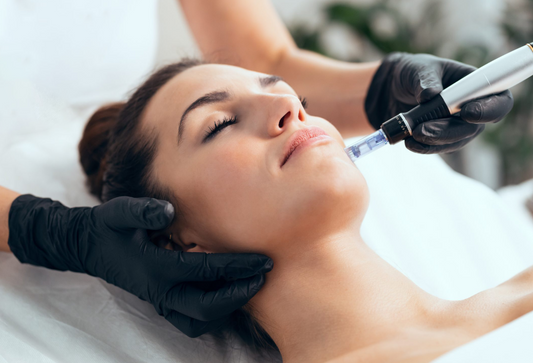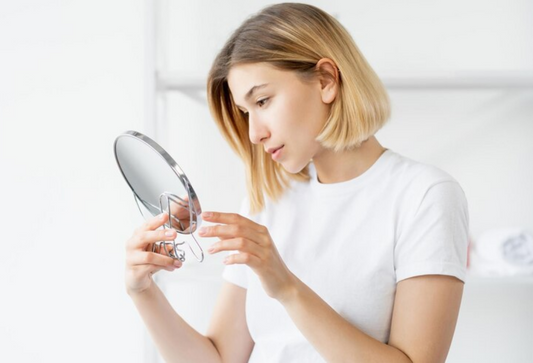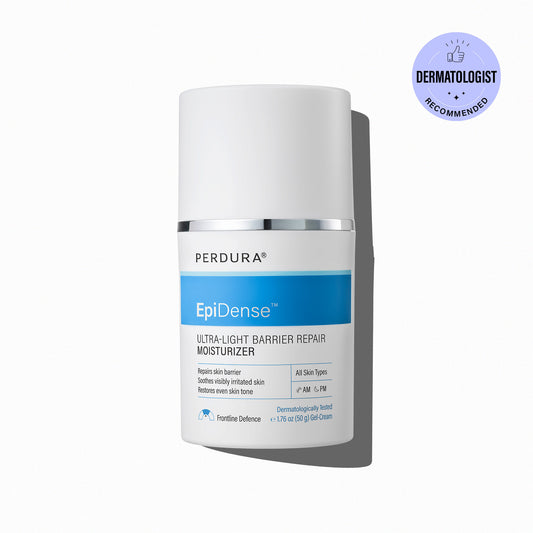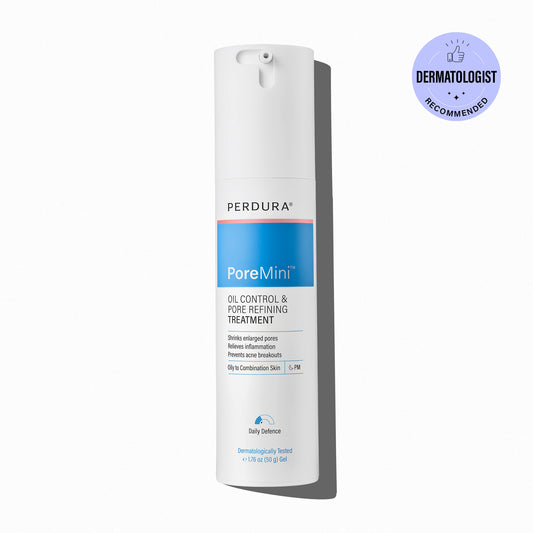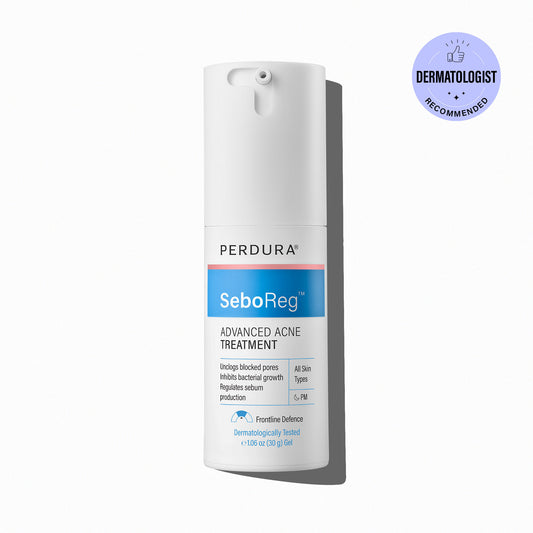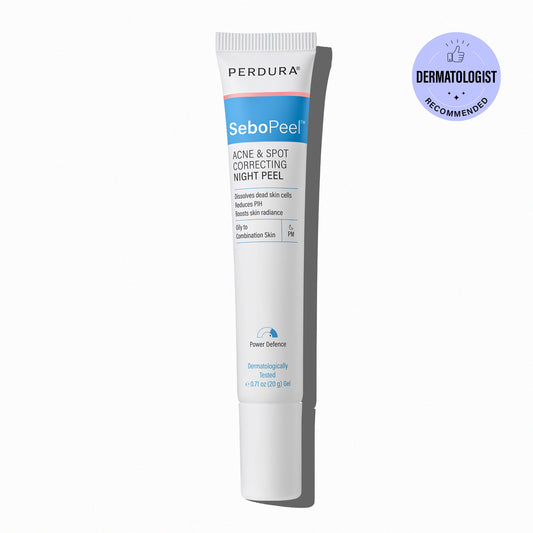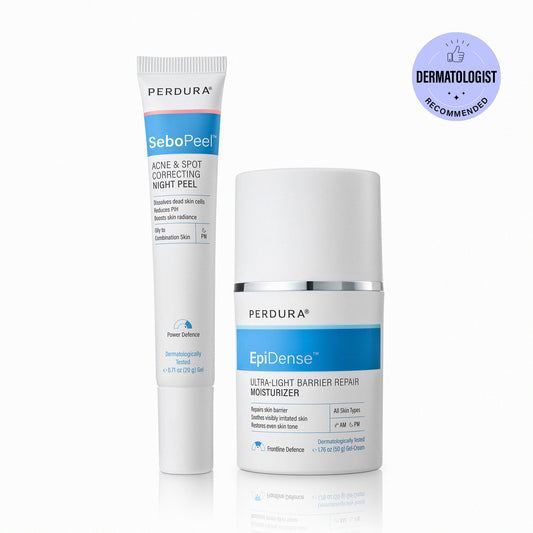Introduction
When we see a signs of new breakouts on our skin - it’s natural to blame the usual suspects - oily skin, sweets, or simple hygiene - like forgetting to wash our face. But there are some lesser-known triggers that may be causing more harm than you would think.
Let’s take a look at come surprising factors that contribute to skin breakouts.

1. Over-Exfoliation
We all want glowing skin, and scrubbing might seem like the answer to clean pores. But aggressive exfoliation, with harsh scrubs or too-frequent use of chemical exfoliants, can disrupt your skin's natural barrier. This barrier is like a shield, protecting your skin from irritants and keeping it balanced. When damaged, it can trigger inflammation, leading to breakouts.

Concerned about a damaged skin barrier? EpiDense's lightweight formula repairs and soothes irritated skin, restoring a healthy, even tone. Restore Balance with EpiDense Moisturiser
Solution: Be gentle! Opt for a lukewarm wash with a fragrance-free cleanser suitable for your skin type. Exfoliate 2-3 times a week with a gentle product, and listen to your skin. If it feels tight or irritated, ease off on the exfoliants for a while.
Uneven skin tone from old acne scars? SeboPeel's night peel gently exfoliates, fades dark spots, and brightens your complexion. Wake Up to Glowing Skin with SeboPeel
2. Hair products
Hair products like styling gels, mousses, and sprays can be wonderful for creating that perfect look. However, the problem arises when these products come into contact with your skin. The oils and waxes they contain can clog pores, especially if you have bangs or tend to touch your face throughout the day.
Solution: Choose oil-free hair products whenever possible. Wash your hair regularly to prevent product build-up, and keep your hands away from your face! If you have bangs, consider using a headband to keep them off your forehead during the day, when at work or during your workouts.
3. Sun exposure
While a healthy dose of sunshine can boost your mood and vitamin D levels, it can also wreak havoc on your skin. Excessive sun exposure can:
- Damage your skin barrier, triggering your body to overproduce oil to compensate. This can lead to clogged pores and breakouts down the line.
- Inflame your skin, worsening existing breakouts and making them heal slower, due to UV rays.
- Lead to sunburn, rashes, and even permanent hyperpigmentation (dark spots), if you are on acne medications. Retinoids (tretinoin, adapalene), tetracyclines (doxycycline, minocycline), and some sulfa antibiotics, increase your skin's sensitivity to sunlight.
Sun Protection Strategies for Acne-Prone Skin:
If you're on acne medication and worried about the sun, here's a multi-pronged approach:
- Look for a broad-spectrum sunscreen with SPF 30 or higher, labeled as "non-comedogenic" (won't clog pores). Look for lightweight, oil-free, spray or gel based formulas labeled for sensitive skin.
- Apply sunscreen generously and evenly to all exposed skin 15 minutes before going outdoors. Reapply every two hours, or more often if swimming or sweating.
- When possible, limit direct sun exposure, especially during peak hours (10 am - 4 pm). Wear protective clothing like wide-brimmed hats, sunglasses, and breathable, sun-protective clothing.
4. Stress
We all experience stress, but it turns out this emotional state can manifest on your skin. When stressed, your body releases hormones like cortisol, which can increase oil production and trigger inflammation – a recipe for breakouts.
Feeling stressed and breaking out? Explore the link between stress and acne in our next post. Break the Stress-Breakout Cycle - Read "Don't Let Stress Ruin Your Skin! Learn the Secrets to Fighting Acne" Here!
Solution: Focus on stress management! Techniques like yoga, meditation, or deep breathing can be incredibly helpful. Getting enough sleep and eating a healthy diet can also contribute to a calmer mind and clearer skin.
5. Your Pillowcase
We spend a third of our lives sleeping, so it's no surprise that our pillowcases can harbour bacteria, oil, and dead skin cells.
This creates a breeding ground for bacteria, particularly Propionibacterium acnes (P. acnes) – the bacteria that contributes to acne development. When you rest your face on a pillowcase teeming with P. acnes, these bacteria can easily transfer to your skin, clogging pores and triggering breakouts, especially on your cheeks and jawline where there's the most contact.
Confused about what your breakouts mean? Our next blog decodes the message your pimples are sending based on location. Read "Acne 101: Everything You Need to Know About Breakouts" Now!
Constant rubbing against a rough pillowcase can irritate your skin, causing micro-tears and inflammation. This compromised skin barrier becomes more susceptible to breakouts from the bacteria already present.
Solution
- Wash your pillowcases at least once a week in hot water (ideally above 55°C or 130°F) to kill bacteria.
- Consider using pillowcases made from silk or satin. These smoother materials create less friction against your skin, reducing irritation. Additionally, some studies suggest silk may have natural antibacterial properties.
- If you're prone to severe breakouts, consider having a spare pillowcase and flipping it over halfway through the week between washes. This provides a cleaner surface for the second half of your sleep.
Conclusion
Remember, everyone's skin is unique, and what triggers breakouts for one person might not affect another. By being a breakout detective and paying attention to how your skin reacts to different factors, you can identify your own triggers and create a personalized skincare routine that keeps your complexion clear and glowing!
Bonus Tip
If you're struggling to identify your triggers or your acne is severe, don't hesitate to consult a dermatologist. They can provide personalized advice and recommend treatment options to get you on the path to clearer skin.
Key Takeaways
- Over-exfoliation can damage your skin barrier, leading to inflammation and breakouts. Be gentle and use a fragrance-free cleanser suitable for your skin type.
- Hair products with oils and waxes can clog pores, especially if you have bangs or touch your face frequently. Opt for oil-free products and wash your hair regularly.
- Excessive sun exposure can damage your skin and worsen breakouts. Use a broad-spectrum sunscreen with SPF 30 or higher, labelled as "non-comedogenic," and wear protective clothing. (Especially important if you're on acne medication!)
- Stress can trigger breakouts by increasing oil production and inflammation. Practice stress management techniques like yoga, meditation, or deep breathing.
- Your pillowcase can harbour bacteria that contribute to acne. Wash your pillowcases weekly in hot water, and consider using silk or satin pillowcases for reduced friction.
- By identifying your personal triggers and implementing these tips, you can significantly reduce breakouts and achieve clearer, healthier skin.

